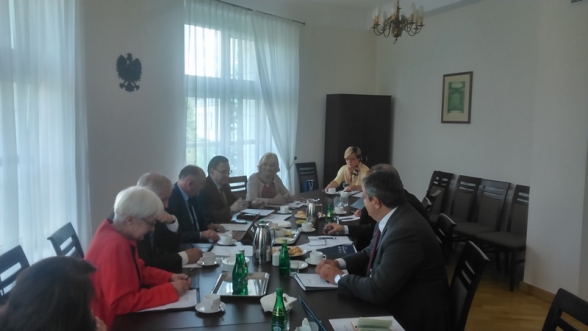During his official visit to the Polish Sejm, the Chairman of the Committee on European Integration, Mr Slaven Radunović, met with the Vice Marshal of the Sejm, Mr Eugeniusz Grzeszczak, as well as with the Chairman and members of the National and Ethnic Minorities Committee, Mr Miron Sycz, MrEugeniusz Czykwin, Mr Ryszard Galla and Mr Danuta Pietraszewska. In addition, the presentation was organized on the subject of the role of the Sejm in the accession period, with special regard to the role of the Parliament and its former Committee on European Integration in the process of negotiations, especially in terms of harmonizing national legislation with the European acquis, and the acting of the Sejm opposed to the Government.
In the jubilee year for Poland with regard to the entry into the European Union and introduction of the multiparty system, the Vice Marshal of the Sejm, Mr Grzeszczak, pointed out that the results of the cost - benefit analysis of the previous work were in favor of the country's commitment, and they showed that the challenges had successfully been met, but also that Poland had significantly prospered since joining the Union. By highlighting the good bilateral relations between the two parliaments, Mr Grzeszczak stressed that Montenegro had the support of Poland on its path towards the EU and that it could count on the support in fields where it would be needed.
In his talk with the Vice Marshal of the Sejm, the Chairman Radunovićsaid that Montenegro was in a different position in the current stage of the accession to that of Poland, pointing to the new approach that the European Commission had introduced, concerning the opening of chapters 23 and 24 at the start of negotiations and their closing at the end of the process. He added that the success of the European integration of Montenegro depended on the political will to introduce the rule of law, as an essential precondition for the implementation of all reforms in the society. On that occasion, he commended the dedication of the Montenegrin administration, which was small, but successfully answering to all the challenges arising through different chapters. Also, Mr Radunovićemphasized that the Polish experience was valuable for Montenegro in the sense that Poland, as the largest Slovenian country in the EU, was an example of a state that successfully completed the accession process and enter the EU prepared.
At the meeting with members of the National and Ethnic Minorities Committee, the Chairman Mr Miron Sycz said that the significance of this working body was that it made decisions by consensus, based on mutual trust of members who are themselves members of different ethnic minorities in Poland. As the greatest success of the Committee, Mr Sycz said it was the adoption of the Law on National and Ethnic Minorities and the National Language, which defined the existence of nine national, four ethnic minorities and one regional language - Kashubian. A decade of negotiation preceded the adoption of the law, but it contributed significantly to the participation of minorities in local governments, particularly in the decision-making process, Mr Sycz concluded.
Speaking on the issue of minorities in Montenegro, Mr Radunović said that Montenegro was constitutionally defined as a civil state, characterized by multiculturalism, familiar with principles of affirmative action with regard to the exercise of certain rights.
Aside from the above mentioned, the Chairman Radunović also met the Chairman of the Friendship Group of Poland and Montenegro, Mr Andrzej Orzechowski and members, Mr Marek Lapinski and Ms Alisija Dabrovska.
Meetings with chairpersons of committees on European Affairs of both Sejm and the Senate were expected for tomorrow, Local Self-Government and Regional Policy Committee, as well as a meeting with the Director of the Directorate for European Affairs of the Ministry of Foreign Affairs of the Republic of Poland.









